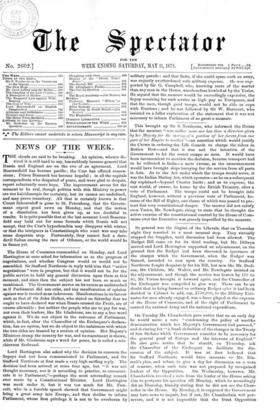Lord Hartington also asked why the decision to summon the
Sepoys had not been communicated to Parliament, and Sir Stafford Northcote at first made a very high-sniffing reply. The decision had been arrived at some time ago, but "it was not thought necessary, nor is it according to practice, to communi- cate it to Parliament,"—perhaps the most astounding remark ever made by a Constitutional Minister. Lord Hartington was meek under it, but it was too much for Mr. Faw- cett, who in a forcible speech showed that Government might bring a great army into Europe, and then decline to inform Parliament, whose first privilege it is not to be overborne by
military parade ; and that India, if she could spare such an army, was unjustly overburdened with military expense. He was sup- ported by Sir G. Campbell, who, knowing more of the matter than any man in the House, was therefore howled at by the Tories. He argued that the measure would be exceedingly expensive, the Sepoy receiving for such service as high pay as Europeans, and that the men, though good troops, would not be able to cope with Russians ; and he was followed by Sir W. Harcourt, who insisted on a fuller explanation of the statement that it was not necessary to inform Parliament of so great a measure.






































